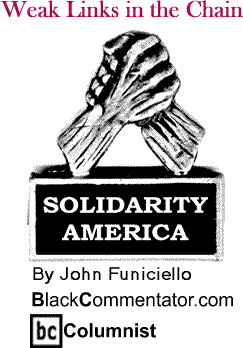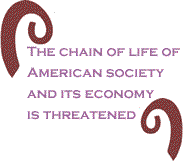
|
|||||||||||||||||||||||

|
|

Custom Search
|
|
 |
|
From
time to time, the powers-that-be give us a new set of “burning questions”
to chew on, mull over for a while, Inevitably, this happens before the current set of burning questions is solved, so, when our representatives get to make up a new set, they know that - at least, for a time - they can ignore the previous set and go on to the next. So, the burning questions are never really solved. Today-s burning questions include the “reform” of health care, the Employee Free Choice Act, and gay marriage, along with the other “family values” issues that are so precious to Republicans and others (and let’s not forget the confirmation of Sonia Sotomayor to a seat on the Supreme Court). These are not unimportant questions, but, stirring great emotions, they take our minds off other questions that similarly should be of profound interest to most Americans: the cost in blood and treasure of two wars of choice, a crumbling economy, global climate change, seemingly insurmountable national debt, torture-as-national-policy, failing schools, and a decaying infrastructure based on cheap petroleum. Shorthand for three of the questions is an easy assignment for the Republicans who are out of power and in need of slogans and propaganda to reach the dwindling number of Americans who take their word as gospel. Health care reform to them is “socialized medicine,” “government takeover of medicine,” something that would replace “the best health care system in the world.” Labor law reform, in the context of the Employee Free Choice Act now before Congress, “would end civilization as we know it,” according to the thousands of lobbyists for Corporate America. Gay marriage would “end marriage as we know it” and would threaten marriage between a man and a woman. The Democrats, for their part, even though they have majorities in Congress and sit in the White House, have yet to show enough spine to even head in the direction where the people want them to go, let alone take bold action on important issues. The various regions of our country, the various groups, the various “sectors” of the economy and the social fabric are like links in a chain. The success of each one is vital to the success of the whole, in the long run. We can ignore each of them for a time and still have the country continue as if nothing is wrong. Complex organisms work that way. It’s why they’re complex - so that nothing bad happens if one of the systems breaks down for a while. But,
when several or many parts of the system break down and there is
no immediate effort to resolve the problem, the whole is threatened.
Other countries have tried to repair those links when they were in need of it. For example, in recent memory, some European countries such as Austria have looked at defense holistically and, as a result, the military budget was a rather small percentage of the defense budget. The rest of the defense budget was geared to making the body politic strong - health care, education, housing, public transportation - ensuring that all of the things that make a society healthy were present in the lives of the people. With the largest defense-military budget in the history of human civilization, the U.S. is weakening many of the links that should make us healthy and strong as a nation. We lack a universal system that would preserve the health of the people, we have pockets of poverty that are never noticed (except every 30 years, or so), we lack housing in both the inner cities and the rural areas, the educational system for millions of children is failing. We have a crumbling “infrastructure” of bridges, roads, and public transit; we have polluted air and water, we have a food system that is concentrating more and more in the hands of a few industrial food conglomerates that tell us what we’ll eat, and we have wars of choice that are going to continue into the foreseeable future. Those wars and the preparations for more wars and policing actions will drain the economic lifeblood of the nation.
The thrust of national policy is now to continue that concentration and make government by a small elite possible. So far, catering only to the links that represent the powerful in America has not brought to the country to its knees, but anyone who has done heavy manual labor knows that the snapping of a link on a big chain can have serious, even deadly, results. The big issues in America can be viewed as links in a strong chain that holds the nation together, at least so far they have held the nation together, but we’re headed for a time when many links are going to snap at about the same time. In a healthy society, the vital links include food, clothing, shelter, health care, and education. Those are the fundamental links and, when they are supplied in abundance, we have a healthy people and, therefore, a healthy nation. Officials at every level of government in America are ignoring the fundamental links. Until these fundamentals are supplied in good measure for everyone, the things that hold us together as a nation and society are in danger. The powerful have a grave responsibility to the nation and its people, and immediate action is required of them. BlackCommentator.com Columnist, John Funiciello, is a labor organizer and former union organizer. His union work started when he became a local president of The Newspaper Guild in the early 1970s. He was a reporter for 14 years for newspapers in New York State. In addition to labor work, he is organizing family farmers as they struggle to stay on the land under enormous pressure from factory food producers and land developers. Click here to contact Mr. Funiciello. |
|
Any BlackCommentator.com article may be re-printed so long as it is re-printed in its entirety and full credit given to the author and www.BlackCommentator.com. If the re-print is on the Internet we additionally request a link back to the original piece on our Website. Your comments are always welcome. eMail re-print notice
If you send us an eMail message we may publish all or part of it, unless you tell us it is not for publication. You may also request that we withhold your name. Thank you very much for your readership. |
|
| |
|
| July
2, 2009 Issue 331 |
|
| Executive Editor: Bill Fletcher, Jr. |
| Managing Editor: Nancy Littlefield |
| Publisher: Peter Gamble |
| Est. April 5, 2002 |
Printer Friendly Version
in resizeable plain
text format or pdf
format. |
| Frequently Asked Questions |
 |

|
 |
 |
 |
| |
| |





























 A
break in one of the links is a call to make every attempt to solve
the problem and get the link repaired, because the strength of the
chain depends on the strength and health of those links.
A
break in one of the links is a call to make every attempt to solve
the problem and get the link repaired, because the strength of the
chain depends on the strength and health of those links. All
of the “links” that make for a healthy society are starved for support,
for the money to make them work. The chain of life of American society
and its economy is threatened, because all of those links are seen
by many politicians as unimportant, compared with military and defense
budget appropriations and tax breaks for Corporate America and the
very rich and the continued concentration of power among the political
class, the giant corporations, and the foreign policy theoreticians.
All
of the “links” that make for a healthy society are starved for support,
for the money to make them work. The chain of life of American society
and its economy is threatened, because all of those links are seen
by many politicians as unimportant, compared with military and defense
budget appropriations and tax breaks for Corporate America and the
very rich and the continued concentration of power among the political
class, the giant corporations, and the foreign policy theoreticians.






